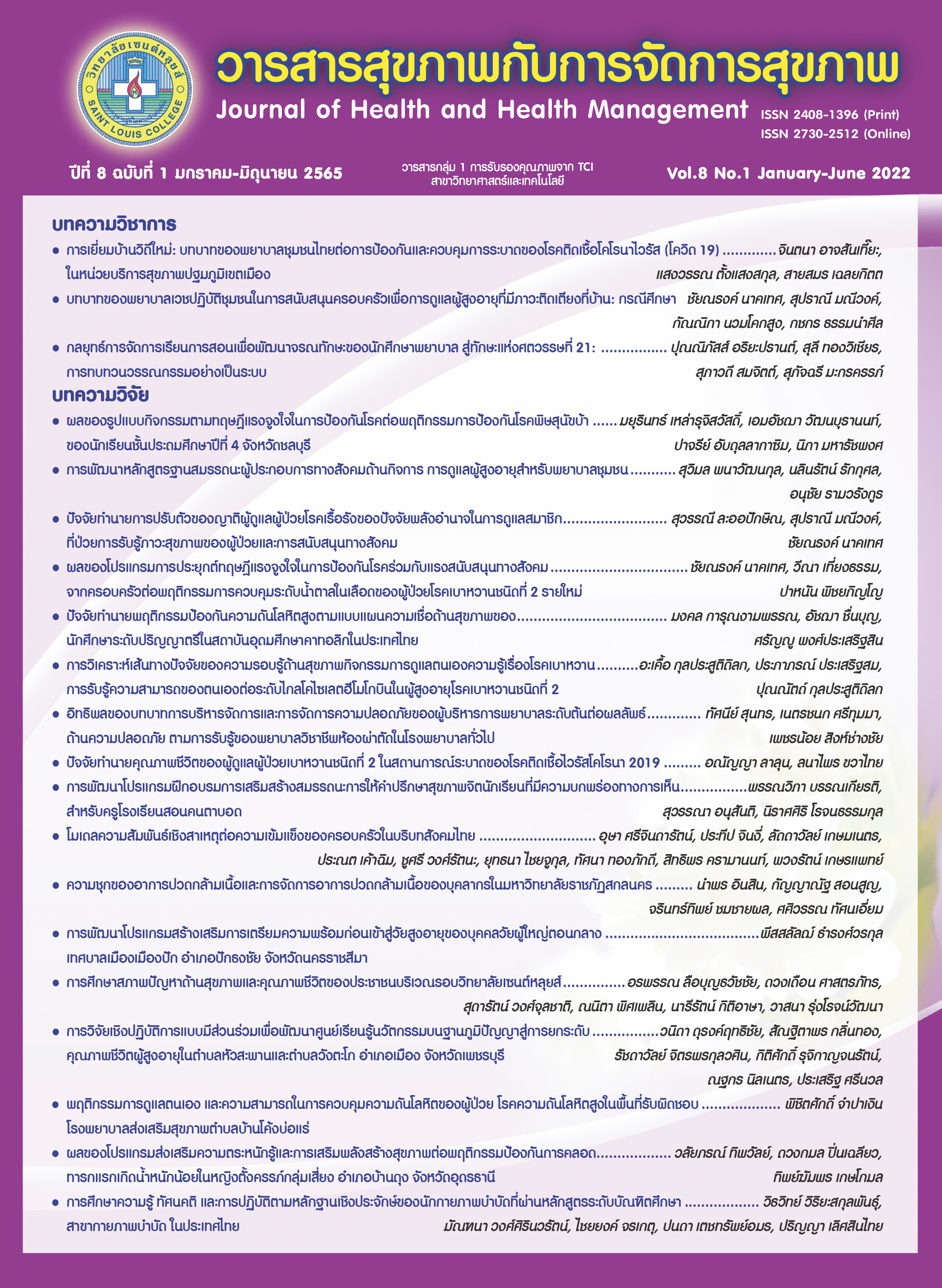Causal Relationship Model of Family Strength in the Context of Thai Society
Keywords:
causal relationship model, family strength, factors affecting family strengthAbstract
The objective of this research was mainly to develop the causal relationship model of family strength in the context of Thai society as applied to the social environment and living conditions of Thais from 1977 until the present, using a quantitative research approach. The samples under study were 300 family heads, who were aged 40-70 years and domiciled in Bangkok and its environs. The variables consisted of eleven causal variables and one dependent variable. The research instruments were twelve sets of questionnaires created by the Group of Researchers, which had a reliability in the range of .64 - .98 and applied a Structural Equation Model (SEM) for data analysis using package software. After adjusting the model, it was found that it aligned with the empirical data, which can explain the variance of family strength at 96%. The family strength was found to exert a significant influence, both directly and indirectly, according to six external and internal factors at the statistical value of .001 Those six factors were social support, opportunity to build family strength, role model on family strength, leadership in the family, intention to build family strength, and awareness of social changes.
References
จรวยพร สุภาพ. (2552). ครอบครัวไทย ความสุข ความเข้มแข็ง. บทความในการประชุมวิชาการอนามัยครอบครัวแห่งชาติ ครั้งที่ 6 เรื่อง ครอบครัวไทย ความหลากหลายสู่ความสมดุล ความสุข และความเข้มแข็ง. กรุงเทพ: ภาควิชาอนามัยครอบครัว มหาวิทยาลัยมหิดล.
ดุษฎี โยเหลา, งามตา วนินทานนท์, ชัยวัฒน์ วงศ์อาษา, และ ทัศนา ทองภักดี. (2545). ความเข้มแข็งของครอบครัว : ครอบครัวสุขภาพดี. วารสารพฤติกรรมศาสตร์, 8(1), 1-10.
ทิพย์วัลย์ สุรินยา. (2550). รูปแบบการเสริมสร้างความเข้มแข็งของครอบครัวไทย. วารสารการพยาบาลจิตเวรและสุขภาพจิต, 21, 26-37.
ประทีป จินงี่, ลัดดาวัลย์ เกษมเนตร, ประณต เค้าฉิม,ชูศรี วงศ์รัตนะ, ยุทธนา ไชยจูกุล, ทัศนา ทองภักดี, ...พวงรัตน์ เกสรแพทย์. (2564). การสร้างองค์ประกอบความเข้มแข็งของครอบครัวตามบริบทสังคมไทย. วารสารพฤติกรรมศาสตร์, 27(1), 18-40
พระมหาอนันต์ อนุตฺตโร (อันวิเศษ), และพระสุชาติ อาภสฺสโร (ผึ่งผาย). (2564). กรรมในพุทธปรัชญาเถรวาท. วารสารวิชาการ สถาบันวิทยาการจัดการแห่งแปซิฟิค, 7(1), 117 – 128
รุจา ภู่ไพบูลย์, สาวิตรี ทยานศิลป์, ระพีพรรณ คำหอม, วรรณี เดียวอิศเรศ, ดารุณี จงอุดมการณ์, จิตตินันท์ เดชะคุปต์, ... นิทัศน์ ภัทรโยธิน. (2562). การศึกษาครอบครัวไทยแบบบูรณาการตามวงจรชีวิตครอบครัว. กรุงเทพฯ: สำนักงานกองทุนสนับสนุนการวิจัย.
วัชรินทร์ จามจุรี. (2550). ศึกษาความสัมพันธ์ระหว่างปัจจัยภายในกับปัจจัยภายนอกที่ส่งผลต่อพฤติกรรมก้าวร้าวของเด็กชั้นประถมศึกษาปีที่ 6 โรงเรียนสาธิตมหาวิทยาลัยศรีนครินทรวิโรฒ ประสานมิตร(ฝ่ายประถม). (ปริญญานิพนธ์).กรุงเทพฯ, มหาวิทยาลัยศรีนครินทรวิโรฒ.
Jöreskog, K. G., & Sörbom, D. (1985). Simultaneous analysis of longitudinal data from several cohorts. InW. M. Mason & S. E. Fienberg (Eds). Cohort analysis in social research(pp. 323-341). NY: Springer, https://doi.org/10.1007/978-1-4613-8536-3_10
Thoits, P. A. (1982). Conceptual, methodological, and theoretical problems in studying social support as a buffer against life stress. Journal of Health and Social Behavior, 23(2), 145-159. https://doi.org/10.2307/2136511
Tichy, N. M., & Devanna, M. A. (1986). The transformational leader. Training& Development Journal. 40(7), 19-32
Downloads
Published
How to Cite
Issue
Section
License
Copyright (c) 2022 Journal of health and health management

This work is licensed under a Creative Commons Attribution-NonCommercial-NoDerivatives 4.0 International License.




